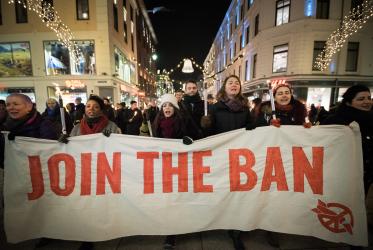By Emily Welty and Jonathan Frerichs
Four weeks of negotiations on nuclear weapons came to a close on Friday 22 May 2015, as the Review Conference of the Nuclear Non-Proliferation Treaty (NPT) ended without a formal agreement. Despite the outcome, a bright new prospect towards a world without nuclear weapons has emerged in the form of a Humanitarian Pledge, now endorsed by 107 states, which promises “to fill the legal gap for the prohibition and elimination of nuclear weapons”.
As the few states with nuclear weapons worked to complicate, and many critics say weaken, the NPT review process, more and more governments without nuclear weapons endorsed the new pledge.
Members of the International Campaign to Abolish Nuclear Weapons (ICAN), including the World Council of Churches and some of its member churches, are promoting the pledge in every region of the world.
The divide between nuclear and non-nuclear nations was apparent throughout the NPT conference at United Nations headquarters in New York. A large group of reform-minded countries told the final session there was “a reality gap, a credibility gap, a confidence gap and a moral gap”. The “reality” gap refers to compelling new evidence about the catastrophic humanitarian impact of nuclear weapons. The “credibility” gap refers to the perceived chronic failure of nuclear-armed states to fulfil their treaty obligation to negotiate nuclear disarmament. The “confidence” gap stems from the same states espousing the goal of a nuclear-weapon-free world while modernizing their nuclear arsenals at the cost of hundreds of billions of dollars.
The “moral” gap is especially wide and of particular concern to representatives of the churches. “The nuclear powers at the conference are claiming that their security is worth whatever these horrible weapons risk doing to others,” the Rev. Dr Olav Fykse Tveit, WCC general secretary said in a statement issued during the meeting. “That is not acceptable. What nuclear weapons do to people and the planet – to God’s wonderful creation – is immoral, unethical and contrary to the will of God,” he said.
WCC representatives met with diplomats from countries where member churches had contacted their government prior to the meeting. Some WCC member churches sent pre-conference letters to governments stressing the need for a legal ban applying to all nuclear weapons, promoting the new pledge as a step in that direction, and lauding recent joint statements in which 159 countries declare “Nuclear weapons must never be used again under any circumstances”. The churches said the new humanitarian approach to nuclear disarmament “has done what the NPT has failed to do—empower the majority in their commitment to eliminate nuclear arms”.
The failure of the NPT to produce a consensus document frustrated the many countries that have fulfilled their commitments to refrain from developing nuclear weapons and who expect the nuclear-armed states to fulfil their legal obligation to disarm.
In open sessions and behind closed doors, nuclear powers attempted to block or weaken disarmament measures. France, the United Kingdom and the United States argued that nuclear weapons provide security and that disarmament must proceed slowly. However, a growing number of states and civil society organizations challenge this rationale and highlight the unacceptable risks that nuclear weapons pose to humanity.
South Africa, which abandoned its own nuclear weapons in the early 1990s, told the conference that states refusing to give up their nuclear arsenals “makes nonsense…of the historic [1970 NPT] bargain that nuclear-weapon states will disarm, whilst others will not proliferate”. South African Ambassador Abdul Minty said, “How long will it take to reach the destination? Do they need some fuel from us to make them go faster, or are they taking rest-stops along the way, or are they simply lost?”
Churches and related organizations in the WCC-led Ecumenical Peace Advocacy Network reminded their governments that this year’s 70th anniversary of the atomic bombings of Japan makes 2015 “a propitious year for real progress on nuclear disarmament.” Arguing in favour of a ban, the churches said, “To ensure that nuclear weapons are never used again, they must be eliminated. To eliminate them, they must be banned.” “The World Council of Churches and member churches are looking to governments to take decisive action in this memorial year,” the WCC general secretary stated.
The Humanitarian Pledge is a refreshing change amid the habitual misuse of the NPT by a few nuclear-armed states to perpetuate their privileges. It is widely believed the proposed outcome document from the 2015 NPT Review Conference was already weak and did not reflect the broad majority calls for urgent and effective measures for nuclear disarmament. Then the US, the UK and Canada – two of the nuclear powers and one of their allies involved in weakening the document – announced that they would not be able to support it at all. They were acting on behalf of Israel, another nuclear-armed state that is not even a member of the NPT. For decades Israel has refused to enter into negotiations to make the Middle East a Nuclear-Weapon-Free Zone, a critical provision of the treaty that is of great importance in the region.
Several governments decried the current situation as “nuclear colonialism” or “nuclear apartheid” because a small minority of nuclear-armed states control both the NPT process and the nuclear weapons that should be eliminated. However, new hope has emerged in the form of the Humanitarian Pledge which supports a process, open to all and block-able by none, “to stigmatize, prohibit and eliminate nuclear weapons in light of their unacceptable humanitarian consequences and associated risks”.
During the NPT conference, WCC representatives delivered a multi-religious statement, “Faith Communities Concerned about the Humanitarian Consequences of Nuclear Weapons”, and served as panellists to discuss the NPT’s disarmament obligation, Nuclear-Weapon-Free Zones and the advocacy role of religious organizations in disarmament processes.
Dr Emily Welty, vice-moderator of the WCC Commission of the Churches on International Affairs, is a university professor in New York City. Jonathan Frerichs is a WCC staff member.
Graphics of countries that have signed the Humanitarian Pledge









